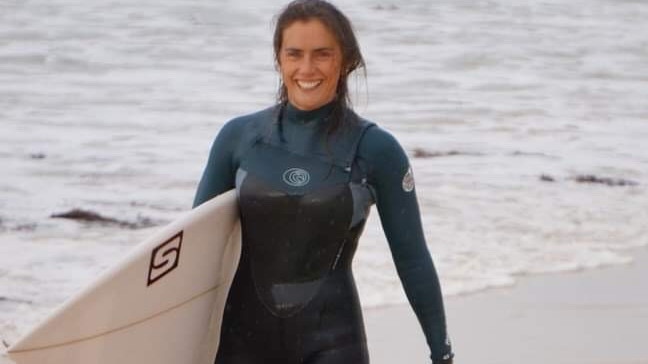Books: Tasmanian author Erin Hortle writes erotic work of environmental fiction
Childhood illness taught emerging Tasmanian author Erin Hortle to seize the day, a quest she shares with the heroine in her novel The Octopus and I.
Entertainment
Don't miss out on the headlines from Entertainment. Followed categories will be added to My News.
Erin Hortle has the bearing of a woman at ease in her body, but the 31-year-old writer, surfer and schoolteacher’s confident physical aura is hard-won.
In this way, she resembles Lucy, the main character of her first novel, The Octopus and I. While Lucy is recovering from life-threatening breast cancer, Hortle endured years of debilitating illness after contracting Ross River virus as a child.
Hortle arrives for our afternoon interview fresh from Rosny College, where she teaches creative writing. Even in her sensible classroom garb — a fine-knit jumper, a flowing ankle-length skirt and short black boots — her strong physicality is so apparent she might as well have arrived by wave, wearing the trademark black wetsuit that makes her look a bit like a seal in the surf.
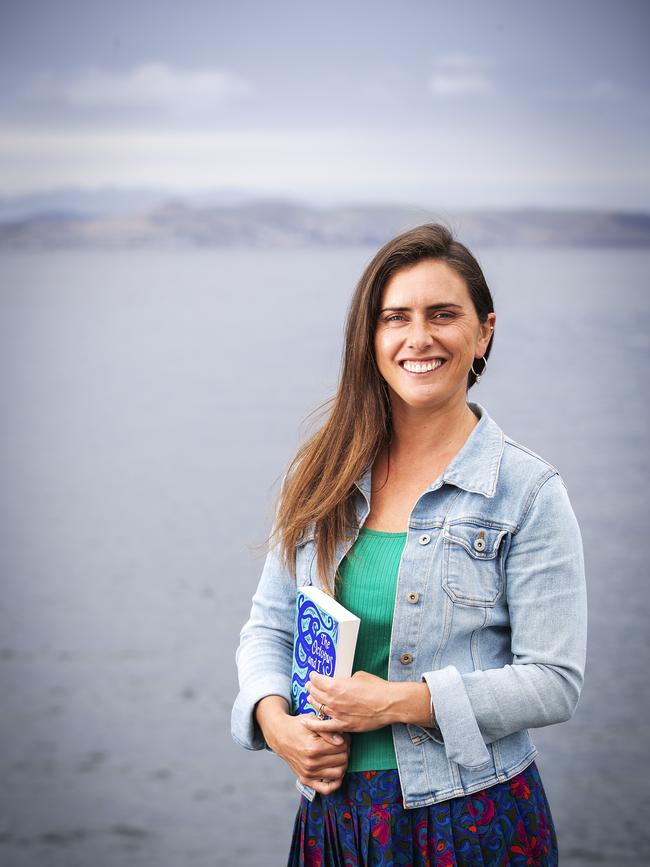
As a literary author, Hortle does not fit the cliche of a fey and bespectacled person who revels in the great indoors. She seems far too earthy and pragmatic for that. Once she starts talking about some of cultural concepts she grapples with in her novel, though, there is no mistaking her sharp intellect, creative drive and imaginative power — all qualities abundantly evident in her novel.
After a soft-release during April lockdown, The Octopus and I was officially launched at a sold-out event for 80 people in Hobart this week. She was joined in conversation at the Friday night Fullers Bookshop event at the RACV/RACT Hotel by fellow Tasmanian novelist Danielle Wood, who was her creative writing post-grad supervisor at the University of Tasmania. Knowing the book better than most, Wood describes her former student’s novel as “exquisitely poetic, fiercely intelligent, deeply Australian and laugh-out-loud funny”.
It’s quite a rap.
Hortle’s the real deal, there’s no doubt about that. So convincingly has she portrayed breast-cancer survivor and devil-park marketing officer Lucy and her on the Tasman Peninsula with her green-leaning abalone-diving boyfriend Jem that it’s disconcerting to hear the author speaking of her protagonists as fictional creations.
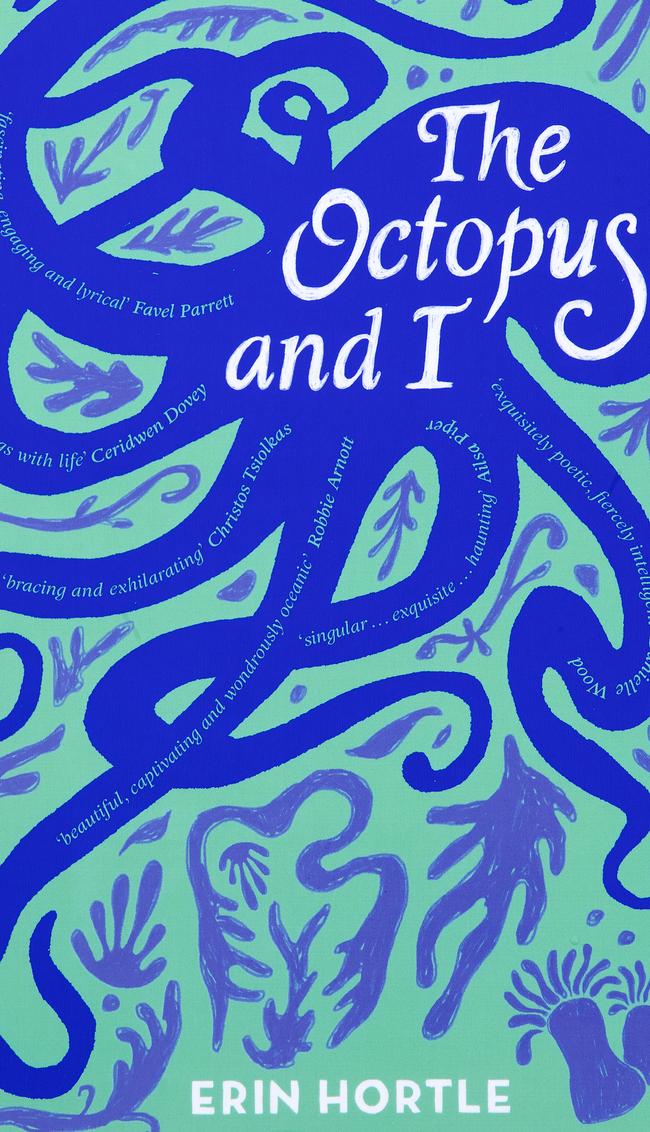
We meet Lucy just before she faces a violent, life-changing incident in chapter one. Before that we are introduced to another female character, who describes the same incident from a radically different point of view — an octopus trying to cross the isthmus that separates the Forestier and Tasman peninsulas at Eaglehawk Neck at night so she can lay her eggs in the open sea.
Hortle renders the scene in lyrical prose, its delicacy counterpointing the more muscular style of the main narrative. It is a shock to leap into the rough and ready banter of small-town life, where if you have a boob job, everybody’s going to know about it — as Lucy discovers after a breast reconstruction following cancer and a double mastectomy.
“About six months before I started writing this I had a conversation with someone who made a flippant comment about someone who’d had a double mastectomy, saying ‘Oh, it’s OK, she can get an even better pair of breasts afterwards’,” Hortle says.
“I found that really striking and potentially problematic. I couldn’t figure out what to think about it. If it’s right for that person, then fantastic, but I also felt it was a flippant way to cover trauma with markers of femininity that are designed potentially for the male gaze — and in the way it was spoken of, that is what was gestured at.
“I kept thinking about the idea that it was ‘a natural thing for a woman to want or do’, but to do so is also to position your body in culture in particular ways. There’s the ‘naturalness’ of making your body ‘unnatural’, and what’s happening on a gender level there?”
At the time Hortle and her partner Ido Luttrell, a Parks and Wildlife ranger and surfer with whom romance bloomed when they both work at Hobart surf shop Red Herring a decade ago, were living on Bruny Island.
“When you are living in small places, people know each other’s business a lot,” Hortle says. “And I thought it would be so interesting to come up with a character who makes that decision [to have implants somewhat larger than her original breasts], but who is able to think it through in complex ways in reference to the patriarchy and things like that, and to put her in a small town where everyone knows her business and interacts with her body.”
Lucy was born and grew on the page. “A lot of those early drafts of heavy-handed characterisation were cut because it was rambling characterisation … it was me just writing to myself to come to understand her,” she says with characteristic pragmatism.
The genesis of Jem, Lucy’s adoring ab-diving, surfer spunk boyfriend whose environmental ideals bring him into conflict with a more redneck element of the town, was different. He was inspired by men she knows, though no particular individual.
“Both Jem and Harry [the other important male character] are particular Tasmanian types,” says Hortle, who grew up at Clifton Beach and now lives with Ido on acreage at Koonya, not far from Eaglehawk Neck.
“Maybe they are mainland types — I haven’t lived elsewhere to know — but I think there’s something really particular about the localism and that fine line between a kind of green politics and that redneck attitude.
“That’s how I frame it up in the book, though I say redneck in a fond way. Each character has a blind spot and ways of relating to a place that aren’t OK but through which they derive their sense of self.
“There’s an oscillation between ‘I live here and I have the right to do that and I can rationalise it in terms of my politics, but other people come in and they are doing it wrong’.”
The entwining octopus content came later in the piece.
“Octopuses are just objectively interesting, which is something I’ve come to know,” says Hortle, who researched their morphology and behaviour in depth.
“I heard about the octopuses [and their breeding habits] and I thought ‘I want to bring that person who is thinking through ideas of female bodies in contact with these completely other female bodies, and see what she does’,” Hortle says.
Lucy becomes fixated after her first close encounter with octopuses, which happens one night when she goes out wading to catch and kill them with two older women, Flo and Poppy, who pickle the molluscs every year.
This is not really a book about octopuses, though, or seals, though a seal character is an occasional narrator. And it is not just a seductively erotic work of ecological fiction.
More broadly, it is a novel exploring sense of place and belonging, specifically female connections with the ocean.
“I wanted to carve out a literary space for women on the coast and in the water,” Hortle says.
Reading Breath by Tim Winton was formative. “As a surfer and someone who spends an extraordinary amount of time in the water, for me that novel really opened my eyes to the potential of writing the ocean,” she says. “I had always thought that essence of surfing was outside of language, but he showed me that it’s not.”
“Breath is a book that’s quite critical of certain types of masculinity, but it’s a man’s story. And every time I looked to the things I liked to do on the coast and looked at literary representations of those things, it was always men’s stories. It’s always men being active on the coast and women being passive or absent.
“I wanted to write a story about women who develop relationships with the coast and have friendships by doing things together on the coast, which has been my experience of my life.”
Unlike the Clifton Beach-raised author, who is an avid, lifelong surfer, Lucy does not surf, but she seeks and finds other ways to immerse herself in the ocean.
“She begins connecting to the coast through her relationship with Jem, but there is that pivotal moment when she spends time with Flo and Poppy and she talks about that immersion into this culture,” Hortle says.
“It’s through connection with other women and immersion in that ink and slime and whatever that she finds that true moment of connection.
“Then as she comes to understand the octopuses, the rest of the novel is about her trying to seek out different ways to have that experience in a way that doesn’t compromise the octopuses, even though she knows they are going to die anyway [after reproducing].”
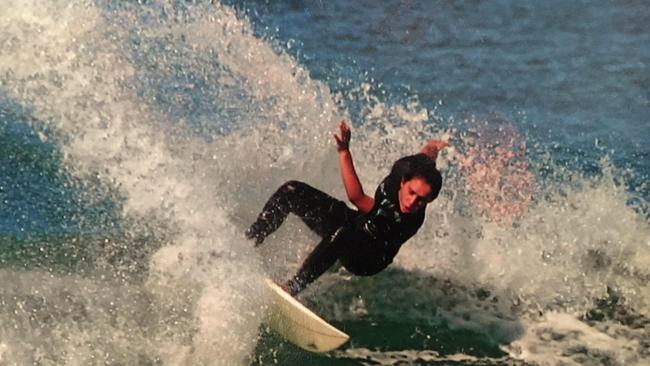
When Hortle was 12, she was bitten by a mosquito carrying Ross River virus and became feverishly ill. The illness left her with debilitating chronic fatigue that played havoc with her health in her teenage years, causing her to miss a lot of school.
By 18, she’d come good and embarked on a UTAS arts degree, majoring in English and History. Midway, her illness resurfaced and she deferred her studies.
“I remember that day, I got to my brother’s house, collapsed onto his bed and Mum and Dad came and got me.”
Three months of illness and frustration followed.
“Most of my interest outside reading and writing involved me being really active and I couldn’t run, I couldn’t surf, I couldn’t be in the water and out in the world. It was Ido who suggested I try something creative,” she says.
“I’d never been particularly skilled at anything creative, except for writing, I think in part because I am colourblind, so visual art was not my thing. I just started writing and the first thing I wrote has actually ended up as a chapter in the novel.”
Though restored to good health, she deferred the next year and she and Ido took off travelling. “All I wanted to do was surf,” she says. “I wanted nothing to get in the way of me being in the water. So we spent five months travelling and surfing in Indonesia and then down the east coast of Australia.”
She returned the following year to finish her BA, going on to do Honours and then a PhD in creative writing, producing much of the novel during that period. Early on she noticed her experience of illness feeding into her writing.
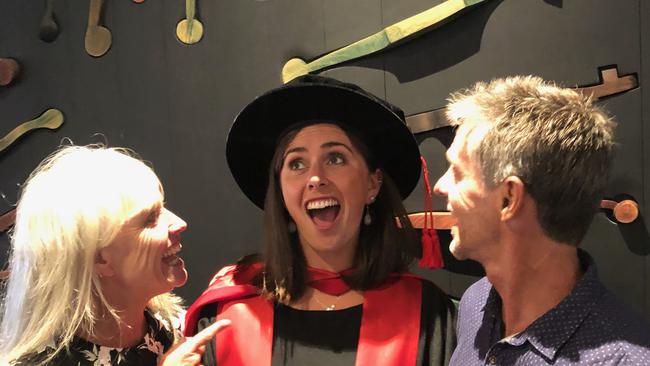
“Lucy is obviously significantly older than me when she gets sick and I had a chronic illness whereas Lucy’s was life-threatening, but like anyone relatively young when they become ill, you develop an idea of your own mortality or the idea your body will fail,” she says.
“I came to that knowledge at the age of 12, which is disturbing to look back on now. At the time, it was the reality of my life and I accepted it. I developed the awareness that you can’t take your body and health for granted, and that when you are well you need to throw yourself into living in an embodied way.
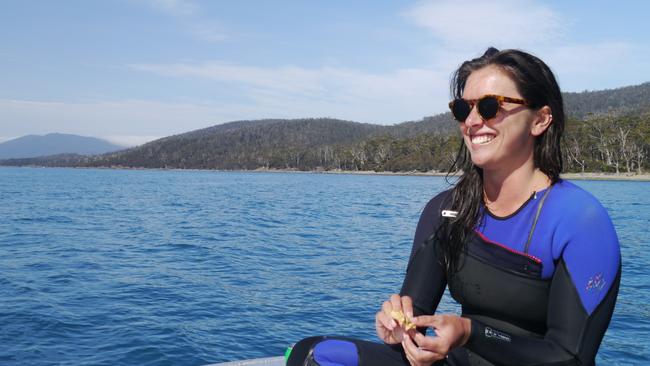
“That definitely drove my idea. Lucy had had that period of intense ill health and the trauma that comes from that; now how will she want to live fully? What will Lucy living fully look like?”
For Lucy the quest leads to the ocean, but she is not a surfer like the author. Hortle refers again to Winton’s Breath to try to explain her devotion to an activity he has described as both pointless and beautiful.
“There’s something about you not doing it for anything but that state of flow that is really liberating,” she says.
“You are in the water. It brings peacefulness and adrenaline at the same time, and that’s a unique combination if you can notice it. I do notice it on a good day. But if I am getting absolutely drilled I just notice the fear. And it can be pretty frustrating.
“I think also, as Rip Curl line goes, it’s the ‘live the search’ thing. Each wave could be your last because the conditions can change so fast.”
The Octopus and I, Allen & Unwin, $29.99
